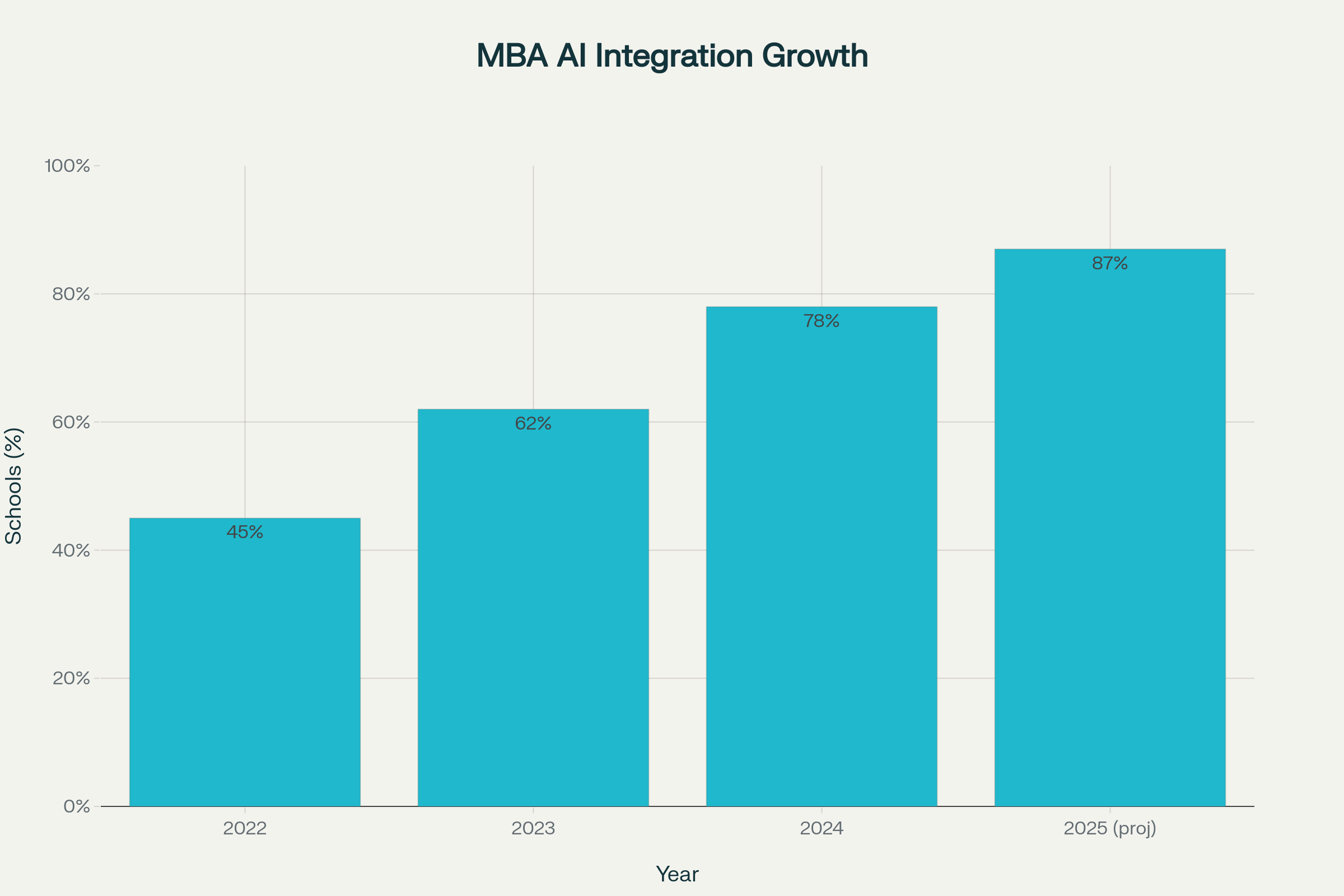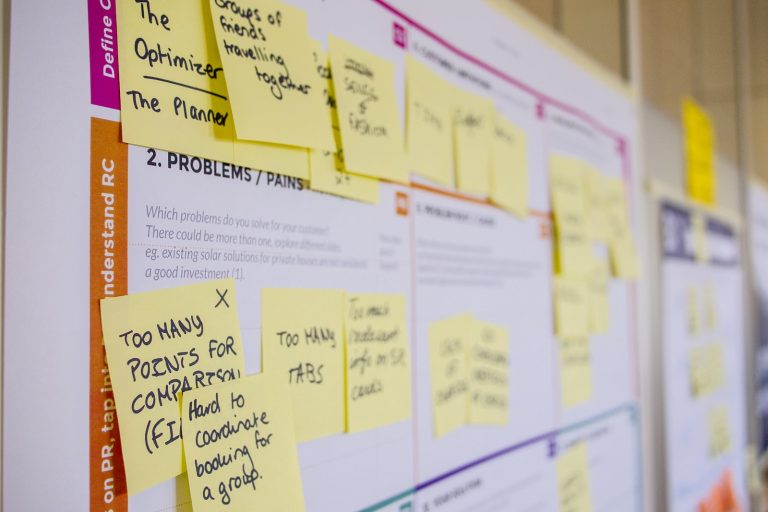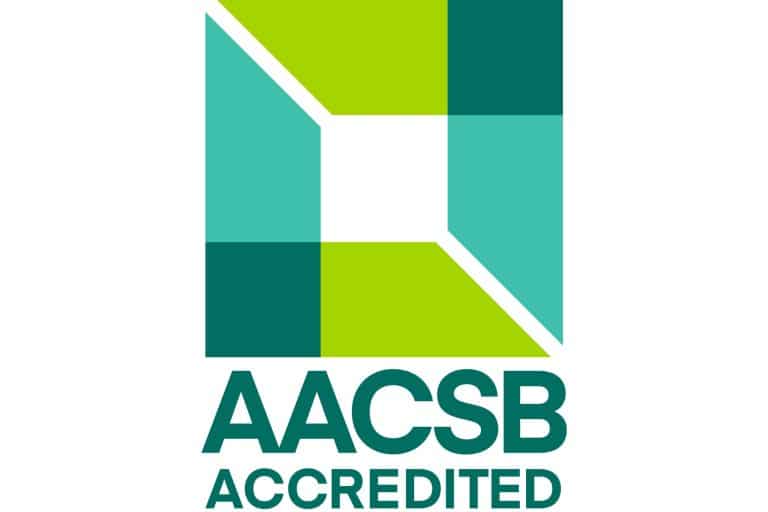Business Schools Deploy Video Interviews to Combat AI-Written MBA Essays as They Simultaneously Embrace AI Education
Top-tier MBA programs are caught in a fascinating paradox: while racing to detect and prevent AI-generated application essays, they’re simultaneously launching comprehensive artificial intelligence curricula to prepare students for an AI-driven business world. This dual approach reflects a strategic shift in how elite business schools are adapting to the AI revolution while maintaining admissions integrity.
The Rise of Video Authentication in MBA Admissions
Business schools are increasingly turning to video interview platforms like Kira Talent to capture authentic, unscripted responses from applicants, effectively countering the growing use of AI tools like ChatGPT in essay writing. The trend represents a significant shift in how admissions committees evaluate candidates beyond traditional written applications.
Video interviews are expanding rapidly across top programs. Northwestern Kellogg, Yale School of Management, MIT Sloan, Oxford Saïd, Cambridge Judge, London Business School, and INSEAD now require video responses as part of their admissions process. These platforms present randomly-generated questions with limited preparation time, making it virtually impossible for applicants to rely on AI assistance or overly-rehearsed responses.
“We’re not trying to trick you or throw curve balls,” explains Bruce DelMonico, senior associate director of admissions at Yale School of Management. “The video essay questions provide a more three-dimensional sense of candidates beyond what’s in their applications.” This sentiment reflects a broader industry recognition that written applications alone may no longer provide sufficient insight into candidates’ authentic capabilities.

Business Schools Rapidly Adopting AI in Their Curricula
The technology serves multiple purposes for admissions committees. Video assessments allow schools to directly observe candidates when many use alumni or students for traditional interviews, meaning admissions staff never meet applicants in person. The format reveals professional presence, communication skills, and how candidates think under pressure—qualities that are difficult to assess through written materials alone.
AI Detection Tools Show Mixed Results
While schools experiment with video interviews, many are also deploying AI detection software to identify essays potentially written by artificial intelligence. However, these tools face significant accuracy challenges that limit their effectiveness.
Testing by Poets&Quants of successful Harvard Business School and Stanford Graduate School of Business essays using Originality.ai—a leading detection service claiming less than 3% false positive rates—revealed concerning inconsistencies. The variability in results has made many admissions offices hesitant to rely heavily on automated detection, particularly given the high stakes of potentially disqualifying legitimate applicants.
Schools are taking varied approaches to AI policies. Brown University explicitly prohibits any AI use in applications, while Columbia Business School permits AI for idea generation and editing but not for generating complete responses. The University of North Carolina at Chapel Hill openly states that it uses or plans to use AI for “basic evaluation of grammar and writing” while emphasizing that no admissions decisions are made by AI.
“There is really no scenario where using AI as a brainstorming assistant, not a ghostwriter, can hurt you,” notes a college admissions expert. “Authenticity still reigns supreme. A compelling narrative grounded in lived experience will always stand out more than a perfectly polished but impersonal essay.”
Business Schools Rush to Embrace AI Education
Paradoxically, as schools work to prevent AI use in admissions, they’re rapidly integrating artificial intelligence into their core curricula. The transformation reflects urgent market demand for AI-literate business leaders.
The Wharton School launched a groundbreaking MBA major in Artificial Intelligence for Business in fall 2025, representing the first comprehensive AI-focused MBA major at an elite institution. The curriculum includes courses in applied machine learning, data science, neuroscience, data engineering, statistics, and a required ethics course titled “Big Data, Big Responsibilities: Toward Accountable Artificial Intelligence.”
“It is no longer a question of if, but how artificial intelligence will fundamentally alter every aspect of business and society,” said Erika James, Dean of the Wharton School. “Business schools have a crucial role to play in ensuring that AI adoption leads to positive outcomes.”
Northwestern Kellogg is launching new MBA courses focused on artificial intelligence and machine learning in fall 2025, featuring a foundational course called “AI Foundations for Managers” taught across five different departments—marketing, strategy, operations, finance, and management. This cross-disciplinary approach allows students to explore AI from their chosen career perspective.
Stanford Graduate School of Business offers extensive AI programming through its Engineering Center for Global and Online Education, including courses specifically designed for business professionals such as “Generative AI Program: Technology, Business, and Society” and “AI-Driven Leadership.”
Market Demand Drives Curriculum Changes
The rapid adoption of AI education reflects concrete market demands. According to the Graduate Management Admission Council’s 2024 survey, 78% of business schools have now integrated AI into their curricula—up from significantly lower percentages just two years ago. Only 22% of surveyed programs report they haven’t integrated AI into student learning, and this number continues to decline rapidly.
Nearly half of prospective MBA candidates now consider AI coursework a “must-have” in their chosen programs, according to GMAC’s 2025 Prospective Students Survey. This represents a dramatic shift in student priorities, with applicants expecting hands-on applications of AI in leadership, operations, and decision-making rather than just theoretical knowledge.
The trend extends beyond elite institutions. Universities ranging from Arizona State’s W.P. Carey School to regional programs are rolling out specialized AI tracks, certificates, and even dual-degree programs blending computer science with business. The result is a rapidly expanding ecosystem of AI-savvy MBA programs creating graduates who understand both the technology and its business applications.
The Authentication Arms Race
The simultaneous push for AI education while preventing AI-assisted applications creates what experts describe as an “authentication arms race” in MBA admissions. Schools must balance detecting potentially artificial content while teaching students to ethically leverage AI tools in their future careers.
Video interview adoption is expected to continue expanding in 2025 as schools seek more reliable methods to assess authentic candidate responses. The format provides what admissions professionals describe as an “unscripted environment” that reveals the authentic candidate beyond polished written materials.
“We are at a critical turning point where practical AI knowledge is urgently needed,” says Eric Bradlow, Vice Dean of AI & Analytics at Wharton. “Companies are struggling to recruit talent with the necessary AI skills, students are eager to deepen their understanding of the subject and gain hands-on experience.”
Implications for Future Applicants
The trends suggest that successful MBA applicants in 2025 and beyond will need to demonstrate both authentic communication skills and genuine interest in AI’s business applications. Video interviews are likely to become standard rather than exceptional across top programs, requiring candidates to develop strong on-camera presentation abilities.
Schools are also placing greater emphasis on profile-based admissions, looking beyond test scores to assess real-world experience with emerging technologies. This shift means candidates should focus on building authentic narratives around their actual engagement with AI tools in professional settings rather than trying to game the system with artificial assistance.
The integration of AI education into core MBA curricula also means that programs are becoming increasingly differentiated based on their technological offerings. Prospective students are now evaluating schools not just on traditional metrics like rankings and placement rates, but on their ability to provide cutting-edge AI education that will prepare them for rapidly evolving business landscapes.
As business schools navigate this complex landscape, the message is clear: authenticity in admissions paired with comprehensive AI education represents the new standard for preparing tomorrow’s business leaders. The institutions that successfully balance these dual imperatives will likely emerge as the clear winners in attracting top talent and preparing graduates for an AI-transformed economy.
References
- Poets&Quants. “Wharton Launches New AI for Business MBA Major & Undergrad Concentration.” April 6, 2025.
- Clear Admit. “The Wharton School’s New AI MBA Major.” April 3, 2025.
- Kellogg Northwestern University. “Kellogg launches new MBA courses in AI and machine learning.” May 30, 2025.
- Stacy Blackman Consulting. “A Deep Dive Into Video MBA Essays.” November 26, 2024.
- MBA Crystal Ball. “Kira Talent Assessment: Complete guide with practice interview questions.” February 3, 2025.
- BestColleges. “Business Schools Focus on AI, STEM, and Fintech in 2025.” January 9, 2025.
- Career Plan B. “MBA Admission Trends in 2025: What’s Changing.” August 1, 2025.
- Poets&Quants. “The Top U.S. & European MBA Programs With AI Concentrations.” April 16, 2025.
- Poets&Quants. “AI Detection Tools On MBA Essays: False Positives? Fakes?” September 4, 2024.
- AACSB. “Transforming Business Education With AI.” March 3, 2025.
- Stacy Blackman Consulting. “Top MBA Application Trends in 2025.” May 30, 2025.
- ApplicantLab. “Dealing With Those MBA Video Questions.” July 21, 2024.



![50 Best Finance MBA Programs in [year] 4 MBA in Finance](https://staging.mbaguide.org/wp-content/uploads/2023/02/brainstorming-over-paper-stockpack-unsplash-768x513.jpg)

![Most Affordable Online MBA Programs in [year] 7 Affordable Online MBA](https://staging.mbaguide.org/wp-content/uploads/2023/04/photo-of-people-doing-handshakes-stockpack-pexels-768x513.jpg)